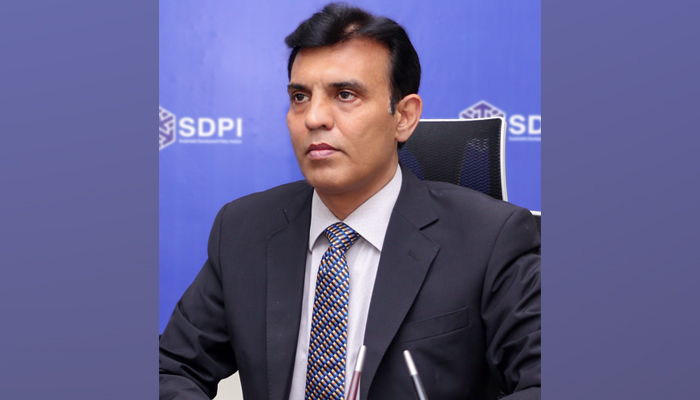Pragmatic framework needed to achieve economic transformation
Islamabad : Speakers at a one-day roundtable on Tuesday stressed the needs for a pragmatic and revolutionary policy implementation framework in terms of taxation and revenue generation to achieve economic and digital transformation to make country resilient and sustainable.
The roundtable titled, “Reshaping the Discourse: The Way Forward for New Government: Economy, Energy, and Digital Transformation,” was organized by Sustainable Development Policy Institute (SDPI) here on Tuesday.
In his opening remarks, Dr Abid Qaiyum Suleri, SDPI Executive Director, said this session seeks to come up with a practical & pragmatic approach for the upcoming government and will focus on how the government can make policies to address issues like tax exemption, subsidy cushion, filling tax losses for economic recovery, and policy and implementation reforms.
Dr Khaqan Najeeb, Senior Public Policy Advisor and former Aide to the Finance Ministry, said the policy designs should be given more space to the private sector. However, he said, it is crucial to maintain micro and macro-economic stability while making the next IMF program.
Amid all this there are some subjects that might be shifted from Centre to provinces, Dr Najeeb said, suggested interventions around debt restructuring of Pakistan along with a need for PSDP reforms (Medium-term agenda for IMF) and analyse the tax expenditure to resonate with the fund.
While commenting on Pakistan’s economic challenges, he said for the IMF programmes completion, it is necessary to evaluate past challenges, and strategize it to ensure its successful implementation. However, he said, the next government, should focus on restructuring the recurring budget to alleviate strain on the economy and prioritize efficiency and sustainability.
To address Debt Repayments issue, he further said with a staggering debt in billions, the government would have to explore debt restructuring options and negotiate with IMF on terms that are manageable and sustainable for economic recovery.
Najy Benhassine, The World Bank Country Director, Pakistan, said: "Economic turnaround requires time and policy continuity is the key to progress. The next government must commit to consistent policies, fostering long-term development,” he said. Dr Sebastian Paust, Head of Development Cooperation, Germany stressed the need to rationalize social protection expenditures and synchronize inter-provincial taxation for stable and realistic policy measures. The new government needs to go into more transparent and realistic negotiations with IMF, he added.
Dr Paust was of the view that learning from Germany and France, Pakistan's next government should explore regional opportunities as fostering regional peace and stability are the keys to sustained progress.
Umer Bhatti from All Pakistan Textile Mills Association underlined the need to diversify export-oriented products and move away from the traditional products and traditional export market. The next government must prioritize balancing act in revenue generation especially by reducing burden of import tariff, reliance on import tariffs from trade policy, and rationalize tariffs for competitiveness besides re-evaluating import substitution for true diversification, he added.
-
 Patriots' WAGs Slam Cardi B Amid Plans For Super Bowl Party: She Is 'attention-seeker'
Patriots' WAGs Slam Cardi B Amid Plans For Super Bowl Party: She Is 'attention-seeker' -
 Martha Stewart On Surviving Rigorous Times Amid Upcoming Memoir Release
Martha Stewart On Surviving Rigorous Times Amid Upcoming Memoir Release -
 Prince Harry Seen As Crucial To Monarchy’s Future Amid Andrew, Fergie Scandal
Prince Harry Seen As Crucial To Monarchy’s Future Amid Andrew, Fergie Scandal -
 Chris Robinson Spills The Beans On His, Kate Hudson's Son's Career Ambitions
Chris Robinson Spills The Beans On His, Kate Hudson's Son's Career Ambitions -
 18-month Old On Life-saving Medication Returned To ICE Detention
18-month Old On Life-saving Medication Returned To ICE Detention -
 Major Hollywood Stars Descend On 2026 Super Bowl's Exclusive Party
Major Hollywood Stars Descend On 2026 Super Bowl's Exclusive Party -
 Cardi B Says THIS About Bad Bunny's Grammy Statement
Cardi B Says THIS About Bad Bunny's Grammy Statement -
 Sarah Ferguson's Silence A 'weakness Or Strategy'
Sarah Ferguson's Silence A 'weakness Or Strategy' -
 Garrett Morris Raves About His '2 Broke Girls' Co-star Jennifer Coolidge
Garrett Morris Raves About His '2 Broke Girls' Co-star Jennifer Coolidge -
 Winter Olympics 2026: When & Where To Watch The Iconic Ice Dance ?
Winter Olympics 2026: When & Where To Watch The Iconic Ice Dance ? -
 Melissa Joan Hart Reflects On Social Challenges As A Child Actor
Melissa Joan Hart Reflects On Social Challenges As A Child Actor -
 'Gossip Girl' Star Reveals Why She'll Never Return To Acting
'Gossip Girl' Star Reveals Why She'll Never Return To Acting -
 Chicago Child, 8, Dead After 'months Of Abuse, Starvation', Two Arrested
Chicago Child, 8, Dead After 'months Of Abuse, Starvation', Two Arrested -
 Travis Kelce's True Feelings About Taylor Swift's Pal Ryan Reynolds Revealed
Travis Kelce's True Feelings About Taylor Swift's Pal Ryan Reynolds Revealed -
 Michael Keaton Recalls Working With Catherine O'Hara In 'Beetlejuice'
Michael Keaton Recalls Working With Catherine O'Hara In 'Beetlejuice' -
 King Charles, Princess Anne, Prince Edward Still Shield Andrew From Police
King Charles, Princess Anne, Prince Edward Still Shield Andrew From Police




